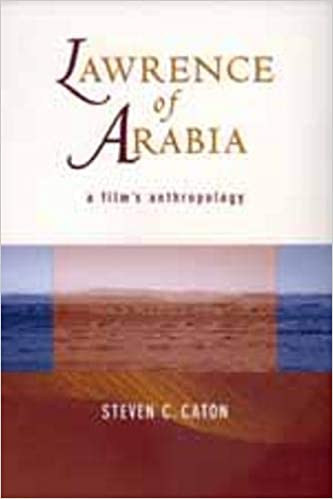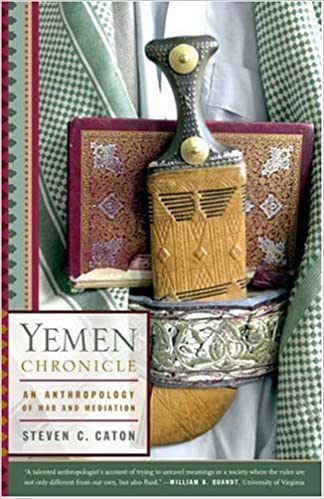Background
Steven Caton was born in 1950 in the United States.

5801 S Ellis Ave, Chicago, IL 60637, United States
Steven Caton studied at the University of Chicago. He got a Doctor of Philosophy.
Philadelphia, PA 19104, United States
Steven Caton studied at the University of Pennsylvania. He got a Bachelor of Arts.
633 Clark St, Evanston, IL 60208, United States
Steven Caton studied at Northwestern University. He got a Master of Arts.
Steven Caton
Steven Caton
Steven Caton








(In this first full-scale ethnographic study of Yemeni tri...)
In this first full-scale ethnographic study of Yemeni tribal poetry, Steven Caton reveals an astonishingly rich folkloric system where poetry is both a creation of art and a political and social act.
https://www.amazon.com/Peaks-Yemen-Summon-Steven-Caton/dp/0520082613
1990

(Combining ethnography, film criticism, and his extensive ...)
Combining ethnography, film criticism, and his extensive knowledge of the Middle East, Steven Caton presents an innovative and fascinating examination of the classic film, Lawrence of Arabia. Caton is interested in why this epic film has been so compelling for so many people for more than three decades. In seeking an answer, he draws from situations in his own life, biographies of the film's key participants, and analyses of issues relating to class, gender, colonialism, and cultural differences.
https://www.amazon.com/Lawrence-Arabia-Steven-C-Caton/dp/0520210832
1999

(In 1979, Steven C. Caton went to a remote area of Yemen t...)
In 1979, Steven C. Caton went to a remote area of Yemen to do fieldwork on the famous oral poetry of its tribes. The recent hostage crisis in Iran made life perilous for a young American in the Middle East; worse, he was soon embroiled in a dangerous local conflict and tribal hostilities simmered for months. Yemen Chronicle is his extraordinary report both on events that ensued and on the many theoretical, let alone practical, difficulties of doing ethnography in such circumstances. Caton also offers a profound meditation on the political, cultural, and sexual components of modern Arab culture.
https://www.amazon.com/Yemen-Chronicle-Anthropology-War-Mediation/dp/0809098822
2005
Steven Caton was born in 1950 in the United States.
Steven Caton attended the University of Pennsylvania. He got there a Bachelor of Arts in 1972. Also, he studied at Northwestern University, where he earned a Master of Arts in 1973. Besides, Caton graduated from the University of Chicago, where he received a Doctor of Philosophy in 1984.
After education, Steven Caton was a visiting lecturer at Vassar College and a visiting assistant professor of anthropology and sociology at Carleton College. In 1985 he served as an assistant professor at Hamilton College, and after three years, he became an associate professor. In 1988, Steven Caton started to work at the University of California. He held the position of assistant professor of anthropology, and then an associate professor. From 1995 to 1998, Caton was an associate professor and chair of anthropology at the New School for Social Research. Since 1998, Steven Caton serves at Harvard University. He is a professor of Contemporary Arab Studies and Anthropology Department. In 2002-2003 Caton was an acting chair of the Department of Anthropology, and in 2004-2009, he was a director of the Center for Middle Eastern Studies. Also, Caton worked in 2014 and 2015-2017 as a professor at New York University.
Besides, Steven Caton is a writer. His writings reflect his professional interest in the desert nation of Yemen, where he has studied the ritual uses of poetry, methods of mediation, and resource conservation issues. Caton's first book, Peaks of Yemen I Summon: Poetry as Cultural Practice in a North Yemeni Tribe, explores the connections between oral poetry and politics in local Yemeni tradition.
During the course of fieldwork for that research, a dispute broke out in the village in which Steven Caton was living, which became the subject of his third book, Yemen Chronicle. It explores issues of event, time, and memory in his field research and ethnographic writing, which he now addresses in more theoretical work that engages anthropologists, historians, and philosophers.
In between these two books on Yemen, Steven Caton wrote Lawrence of Arabia: a Film's Anthropology, a negative dialectical analysis of a film in the mode of the Frankfurt School. Questions of film and visual images more generally are an enduring concern of Caton, most evinced in a series of articles on the events of prisoner abuse by United States Occupying Forces that occurred in the Iraqi prison of Abu Ghraib. Caton contemplates working on turning his thoughts on this complicated subject into a book.
Steven Caton is well known as a writer and educator. He teaches for almost forty years. As a writer, to date, Caton is the author of three books. Besides, Steven Caton is a holder of several fellowships and grants, including a Travel Grant from the American Institute for Yemeni Studies in 2001, a Research Grant from the American Institute for Yemeni Studies, Center for the Environment at the Harvard University, and Wenner Gren Foundation in 2005.
Besides, he is a fellow of the National Humanities Center and Institute for Advanced Study. Other Steven Caton's fellowships include the Fulbright-Hays Fellowship for Pre-Dissertation Field Research, Social Science Research Council Fellowship for Pre-Dissertation Field Research, Summer Stipend Fellowship from the National Endowment for the Humanities, Margaret Bundy Scott Fellowship for Research from the Hamilton College, Fellowship from the American Council of Learned Societies, and Mellon Post-Doctoral Fellowship from Washington University. Also, Steven Caton received an Honorable Mention at the Albert Hourani Book Award from the Middle East Studies Association for his book, Peaks of Yemen I Summon, in 1992.
(In this first full-scale ethnographic study of Yemeni tri...)
1990(Combining ethnography, film criticism, and his extensive ...)
1999(In 1979, Steven C. Caton went to a remote area of Yemen t...)
2005Steven Caton is a supporter of the Boycott, Divestment, Sanctions movement. In his 2014 statement outlining his support for the academic boycott of Israel, Caton wrote that the events of the 2014 Gaza War, also known as Operation Protective Edge, solidified his support for Boycott, Divestment, Sanctions movement. Israel implemented Operation Protective Edge to destroy Hamas attack tunnels and stop rocket attacks from Gaza targeting Israeli civilians, which increased dramatically in the weeks before Operation Protective Edge. Caton clarified that he sees no better way to address Israeli "injustices" than Boycott, Divestment, Sanctions. Addressing critics who argue that it does more harm than good, Caton countered that "it is hard to imagine how the present state of affairs can be worse." In 2015, Caton signed a petition encouraging the American Anthropological Association to pass a resolution that would boycott Israeli academic institutions. He argued that it stands to make a strong statement against Israeli academic institutions and, what he characterized, as the country's mistreatment of Palestinians. Caton also said that he considered the resolution "another tactic to limit Israel's aggression."
When Steven Caton returned to Yemen in 2001 after his fieldwork on oral poetry, he was shocked to see how dire the water situation had become and wondered what he, a social anthropologist, could do about it. In 2005-2006, with a grant from the Wenner Gren Foundation, Harvard University's Center for the Environment, and the American Institute for Yemeni Studies, Caton and a Yemeni colleague, Abdou Ali Othman, trained four Yemeni types of research in anthropological field methods to join them in ethnographic research on water problems in the Sana'a Basin. Caton's ethnographic contribution had to do with international experts and their agencies, as these affect the circulation of knowledge about water use and policies stemming from them in countries like Yemen.
Quotes from others about the person
Pierre Cachia: "Caton is much to be commended for the fieldwork he has done in North Yemen. Readers have cause to be grateful to Caton for his precise documentation of literary activity in a relatively inaccessible part of the world."
